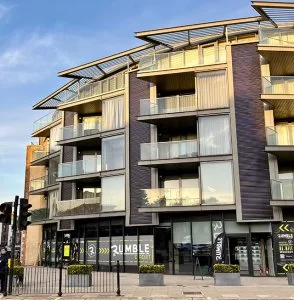Licence for Alterations
Residential Lease Licence To Alter
Homeowners often need their landlord’s permission before making structural alterations to their leasehold property. This page will answer any questions you may have about residential Licence for Alteration, including when a leaseholder might need one and what the process will involve.
Helping residential leaseholders improve their homes
A Licence for Alterations or Licence to Alter is a formal, legal document that a leaseholder requires before making certain alterations to their leasehold flat or house. It sets out the conditions under which the alterations may be carried out and ensures that no unexpected conflicts will arise as a result of the work. At Osbornes Law, we have experienced residential property solicitors on hand to guide leaseholders and freeholders (landlords) smoothly through the Licence for Alterations process. Combining legal and technical expertise, we make sure that all alterations made to the property are accurately recorded, protecting your property investment for the future.
It is not unusual for the owners of leasehold flats to want to make alterations to their homes to modernise or extend them. Most residential leases restrict the type of work you can do, either by prohibiting the work completely or requiring the freeholder’s permission before the work can be completed.
It is important that the leaseholder obtains the correct permissions or they may have trouble selling their home in the future. The freeholder, on the other hand, will want to make sure the property is not damaged structurally or aesthetically, and that the works will not result in complaints from other leaseholders in the building.
With over 40 years of experience, our lawyers can advise both leaseholders and freeholders on the terms and conditions of consent, ensuring the proper protections are put in place. We can also assist with dispute resolution, including a service for retrospective permissions where work has been carried out without the prior knowledge of the landlord.
How we can help
For expert advice or to find out how we can help with your Licence to Alter, please call our specialist landlord and tenant solicitors today or fill in an online form and we will call you back.
To speak with one of our solicitors, contact us by:
- Filling in our online enquiry form; or
- Calling us on 020 7485 8811
Licence for Alterations FAQ
What is a Licence to Alter?
Under most residential leases – even ones that have 150 or even 999 years to run – the leaseholder will need to obtain consent from their landlord before making alterations, extensions or other major changes to the property. A Licence to Alter is a document that contains written permission from the landlord and sets out all the terms and conditions under which the alterations may be carried out.
On one level, a Licence for Alterations is a straightforward permission given by a landlord to a leaseholder. However, the document can be more complex than it first appears. Often, we have to take the considerations of multiple parties into account, including the landlord’s surveyor, the local planning department, building control, banks and mortgage companies, and possibly other leaseholders in the building.
If you’re thinking about making alterations to your leasehold property, then the first step should always be to seek professional guidance. Otherwise, you unwittingly may be breaching the terms of your lease.
When is a residential Licence for Alterations needed?
Whether or not landlord’s permission is required depends on the scope of works the leaseholder is planning, and what the lease says. One of the first jobs for a solicitor is to ascertain whether the proposed works do indeed require a Licence to Alter.
Generally, a long residential lease will contain one of three provisions:
- Alteration is absolutely prohibited. The tenant can still ask the landlord for permission to make the home improvement, but the tenant has no come back if the landlord says ‘no’.
- Alteration is prohibited except with the landlord’s consent.
- Alteration is prohibited except with the landlord’s consent which must not be unreasonably withheld. This means the landlord can only refuse permission for a legitimate reason, such as a concern that the works will weaken the building’s structure or decrease the value of the property. However, the scope of what is unreasonable can be quite complex. This is why you should seek legal advice before any works are started, or any permission is given.
While every lease is different, a leaseholder will not usually need permission for minor home improvements that do not affect the structure or exterior of the building. Some common works that usually will require consent include:
- Moving structural walls, for example, to change room sizes, reposition door openings or move stairs
- Relocating or adding kitchens, bathrooms or wet rooms
- Extending the property
- Loft conversions
- Doing anything to the exterior of the building – this might capture seemingly trivial alterations like installing a satellite dish, so it is important to check the terms of the lease.
Why do you need a Licence to Alter?
A Licence to Alter stops leaseholders from making unsuitable alterations that could be dangerous or diminish the value of the property. It therefore protects the interests of the freeholder and other leaseholders in the building.
If a leaseholder carries out unregulated work to the property, they will be in breach of the terms of the lease. This has a number of consequences:
- The landlord can take enforcement action, such as requiring the property to be returned to its original condition
- It may be more costly and time consuming to obtain retrospective consent once the work has been finalised
- The tenant may experience difficulties in selling the property
- In some rare cases, the tenant risks losing the lease.
What is the Licence to Alter process?
The process will vary from case to case but generally, the leaseholder will provide a description of the proposed works to the landlord including technical information such as plans, drawings and structural calculations. The landlord or its surveyor will consider the impact of the works on the building and decide whether to give consent, and what conditions should be attached to the consent.
The landlord’s solicitor is responsible for preparing the draft Licence for Alterations. Some of the clauses the landlord might seek include:
- The ability to monitor the works whilst in progress
- The ability to inspect the works once completed
- An obligation on the leaseholder to obtain planning permission, building regulations approvals and valid insurance
- Restrictions on carrying out the work during unsociable hours so as not to disturb other occupiers in the building
- An obligations to pay for the repair and redecoration of any communal areas that are affected by the works
The leaseholder’s solicitor can advise on the suitability of these clauses and whether they are reasonable given the scope of the works and the lease provisions.
How much does a Licence for Alterations cost?
The leaseholder is responsible for paying their own costs and also the costs of the landlord in dealing with the Licence to Alter. This includes the costs of the landlord’s surveyor, solicitor and other professional advisors. The tenant also has to pay any subsidiary costs, such as the cost of obtaining planning permission.
For complex works, costs may rack up quickly as the landlord may have to bring in additional advisors, such as an engineer. The help of an expert legal professional is invaluable in making the process as streamlined as possible, keeping your costs to a minimum. Contact us about our services and pricing today.
Shilpa really helped us take charge of the situation and helped resolve this property dispute. I would not hesitate to recommend her or the team to anyone in a similar situation.
On first meeting Shilpa I was sure that she understood immediately my requirements, and was sympathetic both to my financial restraints and my emotional state. She achieved everything I asked of her and proved to be invaluable, professional and efficient
At every step Shilpa alleviated any concerns and stresses we had. Always fast to respond, always professional and super knowledgeable.
Shilpa has helped us through some key property litigation matters (residential and commercial) since 2014 and has delivered on every occasion. One particular issue had kept us in a state of stress and tension for almost a decade and after getting in touch with Shilpa she was able to help us bring the matter to a peaceful and successful conclusion.
I received a call from Shilpa Mathuradas a couple of hours after filling the enquiry form for a callback. She actively listened to my party wall concerns responding with gentle professionalism, answering my concerns, letting me know what is and is not possible and when best to bring in a solicitor. All this within 10 minutes. Excellent.
"They are an outstanding firm to work with. They are consistently impressive in their work."
Excellent in every aspect.
If I had another reason to have to seek legal advice again, I wouldn’t hesitate to use Shilpa, and would recommend her to anybody who needed legal advice.
Shilpa was professional, realistic, and unflappable. Shilpa managed to persuade a reluctant witness to come forward to support my case. She obviously knows her subject very well.
I always had full confidence in Shilpa keeping my best interests at heart. I often didn’t understand the legal language, and she would follow this up with a phone call and patiently explain.
Our Licence to Alter solicitors come recommended
Not only do we have over 40 years’ experience in securing Licences to Alter for residential property owners, we also have the technical knowledge to ensure your licence is dealt with efficiently to avoid any delays. Our skills in this area enable us to provide clear and jargon-free advice to both leaseholders and freeholders, and we specialise in licences for major alterations to high-value homes.
Contact us today for a free initial consultation regarding your project. We’re happy to answer all your questions and advise you on what to do next.
Property News & InsightsVIEW ALL
- 5.3.2025
TOLATA Claim Settled At Mediation
Complex TOLATA claim settled after an extensive mediation We recently settled at mediation, a complex TOLATA case involving a dispute...
Read more - 4.12.2024
Security of Tenure
Security of tenure gives business tenants the right to stay in their property after the lease ends and request a...
Read more - 4.12.2024
Section 25 Notices
A Section 25 notice plays an important role in commercial leases, letting landlords and tenants know what’s next when a...
Read more - 4.12.2024
Section 21 Notices
Guide to section 21 no-fault evictions Evicting tenants is never easy but under the no-fault eviction process, it should be less...
Read more - 18.11.2024
Rent Repayment Orders
Guidance for Rent Repayment Orders (RROs) for Landlords in the UK Rent Repayment Orders (RROs) are legal orders requiring a...
Read more - 13.11.2024
Evicting a Tenant
How to evict a tenant: Guidance for landlords Evicting tenants is rarely straight forward. It is a challenging and complex...
Read more - 16.10.2024
Managing Litigants: Court Powers and Defendant Options
How can the court control a litigant? Most people wish to live out their lives without the need to face...
Read more - 15.10.2024
How do you determine a boundary?
Whether the boundary dispute relates to a rear garden boundary or whether it relates to a driveway, the issue of...
Read more - 14.10.2024
Can You Challenge a Restrictive Covenant?
Challenging a restrictive covenant! Is it obsolete? It is well known that section 84(1) of the Law of Property Act 1925 allows...
Read more - 22.3.2024
The Renters Reform Bill
A Review of the Renters Reform Bill The 2019 Conservative Manifesto made a commitment to end “no fault evictions”. This has...
Read more - 22.3.2024
Client successful in TOLATA proceedings
The case related to proceedings under the Trusts of Land and Appointment of Trustees Act 1996 (“TOLATA”) in respect of joint...
Read more - 23.1.2024
Freehold Service Charge Disputes
Service Charges & the Leasehold and Freehold Reform Bill The Leasehold and Freehold Reform Bill was introduced to Parliament on 27...
Read more - 23.1.2024
Know your Rights (of Way)
If you have a question or concern over a right of way on your property, it is important to seek...
Read more - 23.1.2024
Party Wall Etc Act 1996 v Common Law
The case of Power & Kyson & Shah [2023] EWICA Civ 239 The case of Power & Kyson & Shah [2023] EWICA Civ 239...
Read more - 27.10.2023
The Building Safety Act 2022
Introduction to the Building Safety Act 2022 This much awaited Building Safety Act 2022 was introduced into Parliament on 5th May 2021 as...
Read more - 22.8.2023
Reasonableness of Service Charges
Reasonableness of Service charges under the Landlord and Tenant Act 1985 It is well known that the relevant costs that a...
Read more - 11.5.2023
Overlooking Nuisance Claims
The Supreme Court’s Ruling on Overlooking as Private Nuisance In the case Fearn v Tate (2023) UKSC 4, the UK Supreme...
Read more - 5.2.2023
Japanese Knotweed: Knot in my backyard again!
Huge legal bill after selling home with Japanese knotweed Many will have read the recent case in which a furniture...
Read more - 9.6.2022
TOLATA Claims
What is a TOLATA claim? A TOLATA claim is a legal process under the Trusts of Land and Appointment of...
Read more - 8.6.2022
Right to Light Explained
What is the Right to Light? The right to light is a type of ‘easement’ – a legal right giving property...
Read more - 8.6.2022
The Dangers of Rent-to-Rent
What is Rent-to-Rent? Rent-to-Rent refers to the practice of landlords letting a whole property to a tenant (usually a limited...
Read more - 5.10.2021
Buying a Property with a Party Wall Agreement
Introduction to buying a house with a party wall agreement Buying a property can already be stressful, but finding out...
Read more - 10.8.2021
Beneficial Interest in Property
What does beneficial interest in property mean? A beneficial interest in property gives someone the right to share the benefits...
Read more - 26.6.2021
The Risks Of Buying Properties Off Plan!
Buying Property Off Plan The Daily Mail reported that 300 families a week have to move into shoddy newly built homes....
Read more
The Property Litigation Team View the whole team
William Ford
 Partner
Partner
Housing and Social CareShilpa Mathuradas
 Partner
Partner
Property LitigationMuna Adam
 Solicitor
Solicitor
Property LitigationJames Mayall
 Solicitor
Solicitor
Property LitigationEllie McEvoy
 Paralegal
Paralegal
Property LitigationAlex McMahon
 Senior Associate
Senior Associate
Housing and Social CareLeopoldine Mineo
 Solicitor
Solicitor
Property LitigationAlex Panayi
 Solicitor
Solicitor
Property LitigationHeena Shah
 Solicitor
Solicitor
Property LitigationAnna Van-Haute
 Paralegal
Paralegal
Property LitigationView the
whole team



























